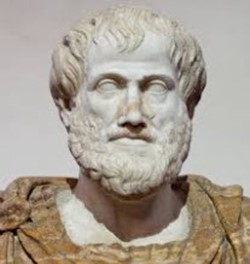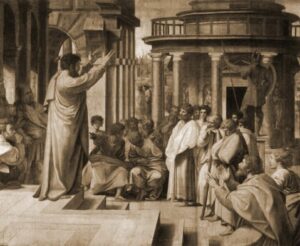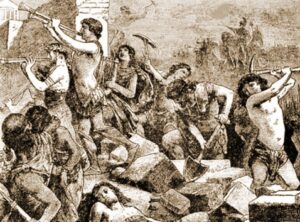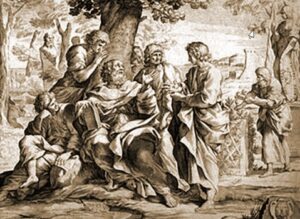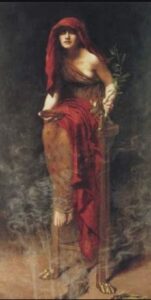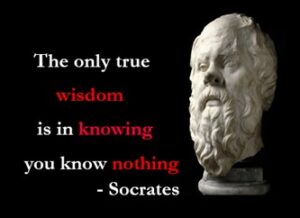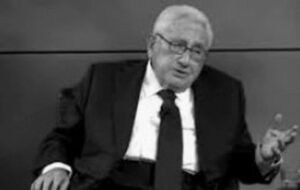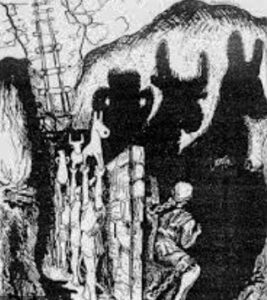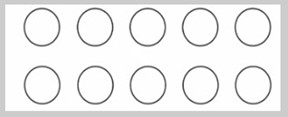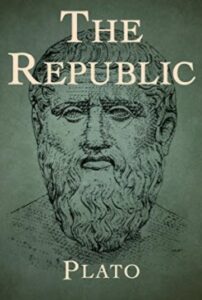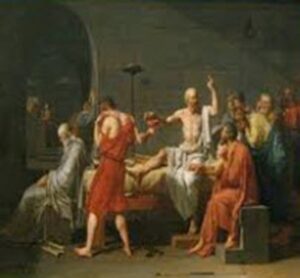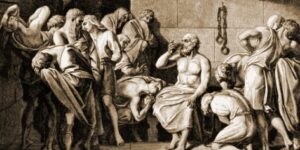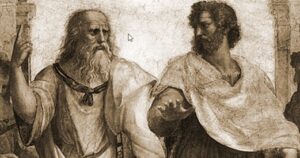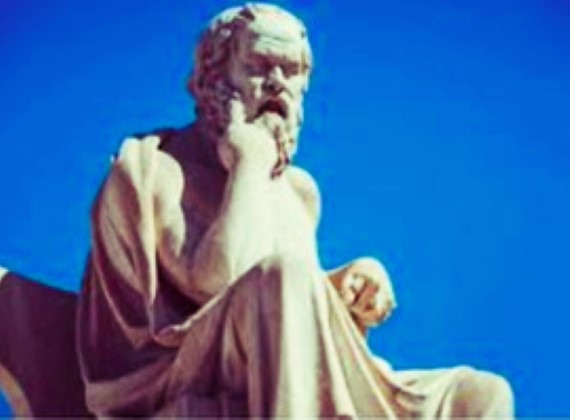
Around 2,500 years ago in a city called Athens, a certain person was executed. Why? Because he was nosey and asked too many questions. Now, there were many philosophers before his time which teachers and academics will know but it really is Socrates who effectively put philosophy on the map. So, let’s call him Saint Socrates the Patron Saint of Philosophy.
He was as best as it can be but a weirdo. He had a boxer’s nose, the stomach of someone who ate too many cakes and really very strange. Somewhere along the line, this Socrates really did fit the bill of an academic. However, yes, he was an ugly man and as often as not refused to wash, but he made up for it with great charm that he deployed and, wow, what a mind.
Everyone in the city really knew that though never finding another person like him again, he was effectively unique. But there was another aspect of his character that people detested, he was so annoying. Do you know what it is like to have a fly around when you are eating? It actually causes you no harm but so irritating. Now, as always in cities some loved him, some hated him, but the biggest problem was those who thought he a kind of subversive.
The whole thing is a bit strange really, because when he was young what a fighter and what a soldier he was especially when Athens fought wars against the Spartans and those who supported Sparta. As time passed things sort of changed. In his late thirties, he would wander around Athens and stop people in the street like some sort of madman asking difficult questions. The trouble is that is all he did, however, his razor-sharp mind made the questions seem easy, but the reality was quite the opposite.
Let me give you an example: his chat with Euthydemus. For example, Socrates asked him whether a person who was deceitful was immoral. On the face of it even today an easy question. Euthydemus said ‘yes. It is obvious.’ Socrates then said, “but what if your friend is depressed and wants to kill himself but you steal his knife?” Surely that is being deceitful, isn’t it? Euthydemus said, but of course. Socrates said, well surely that’s more moral than immoral? Surely, it’s a good thing not a bad thing despite it being a deceitful act?
Euthydemus said “yes well, I suppose so” but his head was all over the place. What Socrates was trying to do was a clever example that being deceitful is immoral but not always. Euthydemus hadn’t really thought or really figured this out. As time passed Socrates was showing to the people of Athens that they didn’t really know what they thought they knew. Often as not a soldier would tell a story about courage but after minutes with Socrates, he would be completely confused.
You see Socrates loved to test the limits of what people understood and then to question the basis of their lives. Whenever someone had a conversation with Socrates, and they realised they knew very little about life for him was a great success. Now, at the time in Athens, the rich would send their children to study with the Sophists. Today we send our children to private schools. A world of a difference from the Sophists who were very clever teachers and teach their students the art of public speaking.
Now, for this course, they charged extremely high fees, and nothing has changed today. Completely, in contrast, Socrates changed the square root of nothing. There was a reason for this. Socrates claimed he didn’t know anything, so how could he charge for teaching for what he didn’t know. Far from stopping students listening to his courses loads and loads and loads went looking for him. If social media has been invented way back when he was around, he would have loads of followers.
You could imagine though this did not make him a number one guy with the Sophists. Once a friend of Socrates called Chaerephon went to the oracle of Apollo at Delphi. Now, who was the oracle? The oracle was a wise old woman, some kind of sibyl, who would answer any questions put to her. Her speciality was that her answers were in the form of a riddle. Chaerephon asked the oracle ‘is anyone wiser than Socrates?’ The woman came back no, no-one is wiser than Socrates. In those days an endorsement of that nature would like being elevated to the House of Lords.
When Chaerephon reported back to Socrates he was totally bemused and in a panic. He asked his friend how in heavens name can I be the wisest man in Athens when I know almost nothing. For the following years, Socrates would question people to see if anyone was wiser than he was, years later he understood that the oracle had been right. You see even today lots of people are very good at the various things that they do. Bricklayers are very good at bricklaying. The military knows about fighting. Mechanics know about cars. But none of them can be deemed wise because they didn’t really know what they were talking about.
You will be surprised to learn that the word ‘philosopher’ comes from the Greek words which actually mean ‘love of wisdom’. What is wisdom? My interpretation has always been the ability to use knowledge. Wisdom is based on argument, applying reason and being a nosey parker by asking questions. It is not believing things because some big shot has told you that they are true. For Socrates, it had nothing to do with knowing lots of facts or even having to perform tasks. For him, it was all about why we exist and the limits of what we are able to know.
These days philosophers’ sort of ask a few questions, touch on a little bit of evidence but struggle to really comprehend important questions that we more or less can know about reality or even how we should live. Today the philosophers have a big advantage over Socrates. What do you think the advantage is? I tell you, 2,500 years of existence that one can consider philosophical thinking. What made Socrates so wise and so great (and a pain in the neck) was that he kept on asking questions and more importantly something that the Greeks didn’t do so much was to debate ideas.
His way of thinking was that life was worth zilch unless you can think about what you are doing. He said that for horses and sheep not examining an existence is okay for them but certainly not for man. Now something strange about Socrates is that only one other person copied his way of working. Socrates completely refused to write anything down, Henry Kissinger the Secretary of State for President Nixon was the same. When Kissinger delivered his opinion on anything it was never written down. His explanation was really quite simple. Why do you think?
Okay let me tell you and when I do, you’ll think wow, this is really so simple. Words can’t answer you back. They can’t explain anything especially if you don’t understand them. Complicated words are difficult to understand but a conversation face to face is an awful lot better. For example, you can suss out the kind of person you are dealing with. Is it a big person? Is it a small person? Do they have blue eyes? Brown eyes? Etc… On that basis, you can more or less adapt what you want to say and what message you need to put across. So, how then do we know about Socrates’ if he wrote nothing down?
Well, one of his pupils was a guy called Plato and only through him and his written words can we get the gist of what Socrates was all about. Plato wrote down a serious of what are called ‘Conversations’ between Socrates and the citizens that he questioned that are known for the record as ‘The Platonic Dialogues’ which actually if you think about it and get a chance to have a good old nose at them are not only about philosophy but also literature. Reading Plato you really do understand just what a clever guy he was but also what a pain in the neck he could be.
The situation though isn’t really that forthcoming because how do we really know if Plato actually wrote down what Socrates really said or whether he was really putting ideas into the character which he calls Socrates but are in fact Plato’s own ideas if you get the gist of this. For example, if you get to study philosophy in detail one of the things that comes up is that most of the ideas that Plato puts forward for example, that the world isn’t really what it’s made out to be and is actually Plato’s concepts credited to Socrates. To put it frankly, is there a difference between what appears to be and reality?
Most people and probably you too mistake appearances for reality you think you understand but you don’t really. One of the biggest problems with Plato is that he believed only philosophers understood what it was all about -people consider the nature of reality by thinking instead of relying on their gut instincts and senses. Let’s see if I can paint a picture so you understand, Plato described shall we say a cave for example, in that illusional cave shall we say there are people chained facing a wall. Now in front of them, they sort of see flickering shadows that they believe are actually real. But they are not. What are they then?
Well, they’re shadows made by objects held up in front of a fire behind them. Crazy thing is that these people will spend their whole lives actually thinking and believing that the shadows projected on the wall are the real world. The story doesn’t end there though. One of the prisoners breaks free from his chains and looks towards this fire. He can’t see properly at first but then after focusing he starts to see where he actually is. He crawls out of the cave and finally able to see a beautiful sun. When he comes back to the cave not a single person believes him as to what the world outside is like.
The man who actually breaks free said Socrates is, in fact, a philosopher. He sees far beyond any type of appearance. The common herd or the politically correct phrase the ordinary people have zero idea about reality. Why? Because they’re really happy just looking at what’s in front of them rather than thinking deeply about it. But those appearances are very deceptive. Like those in the cave what they see are shadows and not reality. Now all this about the cave is actually what ultimately is known as Plato’s theories of forms.
Let me see if I can make you understand what this is all about in simple terms. Have a think, for example, say all the circles you can remember in your life can you say that any one of them was actually a perfect circle? Of course not. Not a single one can be absolutely perfect, and I’ll tell you why. Every point in a perfect circle on its circumference is exactly the same distance from the centre point. Now real circles never get to this level, but did you pick up on when I used the words ‘perfect circle’? What actually is a perfect circle? If you are asking Plato, he would reply a perfect circle is actually a form of a perfect circle.
So, if you want to want to get the hang of what circle is you have to concentrate on the form of the circle not actually the circles you might be able to draw. Drawing is achieved through your visual sense and those are far from perfect in some ways. If for example, you want to understand what goodness is, you have to concentrate on the form of goodness, not on examples of what you witness. You see philosophers are guys and women who really think about forms in a kind of abstract way whilst ordinary people are distracted by the world as they kind of grasp it through their senses.
Philosophers are really good at thinking about reality so Plato believed that they should be in charge and actually have all the political power, not politicians. Plato’s probably most famous book ‘The Republic’ and please get a chance to have a gander if you can. In that book, Plato described what was an imaginary utopian society…Oops…Let’s get plain English language: a perfect society. According to Plato and the Republic, philosophers would be right at the top of the ladders and would get a special education but, they would have to sacrifice their own pleasures for the people they ruled.
If that was applied today, there would not be a single politician in power. Now below those would be the military would be trained to defend their country and below them those doing the actual graft normally the workers. According to Plato if you keep it that simple in 3 groups it would be a sort of perfect balance like for example, a well-balanced mind with a teeny weenie bit of a responsible part keeping the emotions and desires in check. Regrettably that type of model of society is anti-democratic as that would keep people under control by a combination of lies and force. Don’t that sound familiar?
Plato in his Republic would probably have banned art because art gives a false representation of reality. You see painters paint appearances, but as stated appearances can be deceptive about the forms. Every single part of life in Plato’s ideal republic would have the strictest control from the top. Today we call that totalitarian state. Plato then thought that by giving people a vote was a little bit like passengers steering a ship or a plane. Surely, it’s better to let people who know what they are doing take charge? Getting to sound even more familiar, isn’t it?
Unfortunately for Plato the 5th century Athens was completely different to Plato’s world in the republic. Now check this out it was a sort of democracy but only 10 % of the population could vote. Women and slaves had automatic exclusion absolutely no chance that they could ever get a say in anything. However, citizens were all equal before the law and there was a type of system deployed to ensure that everyone had a fair chance of influencing political decisions. Athens didn’t really rate Socrates at all and no-where near as much as Plato valued him. Many citizens of Athens thought Socrates was dangerous and deliberately challenging and undermining the government. In 399 B.C Socrates was 70 years old or more or so of age and a citizen called Meletus sued him.
A weird court case but he claimed that Socrates was ignoring the approved Gods of Athens and, in fact, even introduced his own. In his Writ, he also said that Socrates was teaching the young of Athens to misbehave and to turn against the authorities. Now, these at that time were serious allegations almost similar today to charges of terrorism. It’s quite hard to say really whether there was anything in these charges. Socrates discouraged students from following the approved religion and he enjoyed winding up the government about the so-called democracy. But the problem was that many from Athens actually believed the charges. Athenian Law where there were 501 citizens as a huge jury and just over half of them brought in a verdict of guilty. The sentence was death.
Now, the facts are that if he really wanted too, he could have easily talked his way out of being executed. Instead, he continued arguing that he had done nothing wrong and rather than executing him they should be rewarding him with free meals for the rest of his life. You could imagine that didn’t go down too well, he was killed or executed whichever you prefer by being forced to drink poison from hemlock which is a plant which gradually paralyzes the whole body. Socrates died in a spectacular fashion by saying his goodbyes to his wife and 3 sons and had all his students around him. If he had had a choice to actually continue living in peace and quiet and not asking any more difficult questions, he preferred to die his inner voice told him to keep questioning everything and that he could not betray. He drank the poison and died.
Socrates, however, lives on today through Plato’s dialogue. This pain in the neck man who questioned every blessed thing he would rather die than stop thinking about how things really are. That man has been the inspiration to philosophers today. What was the impact of Socrates? In many ways, he didn’t die at all because Plato carried on teaching in the spirit of Socrates and who do you think was Plato’s most impressive pupil? Aristotle who was very different from either Socrates or Plato but that is a story for another day.
GDS
© 2016 – Gdistefano –All Rights Reserved
First published 2016 and then 2020.
NB: Some images retrieved from Google, will remove at owner’s request.

